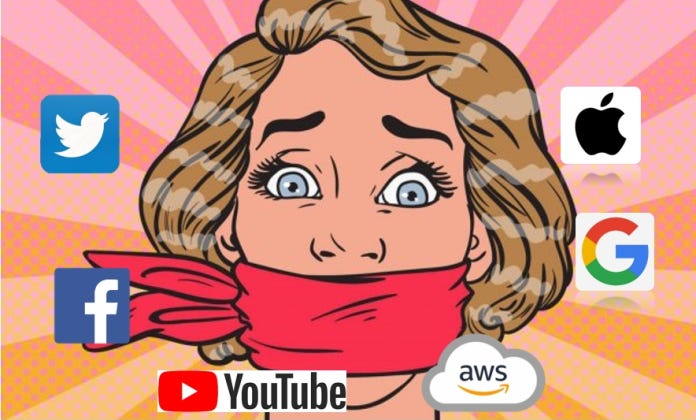Way, way back in the technological Dark Ages, when the Internet was just starting to become a thing, it was a safe bet that, if you met someone computer-savvy, you'd be meeting someone with libertarian tendencies. I saw it all around me - in the people I met, the stories I read, the science fiction being churned out - the lifestyle fostered a sense of independence and aspiration for achievement apart from Big Daddy Government.
The mythos of such as Jobs, Gates, Schmidt, Bezos, Allen, Zuckerberg, Thiel, Dorsey, and McAfee was one of disruptive upstart, kicking down the calcified structures of old-school information technology, wherein the likes of IBM Chairman Thomas J. Watson's suggestion that "there is a world market for about five computers."
The growth of their wealth and power was certain to dim the frontiersman attitude, as the realities of Big Business and its love-hate relationship with Big-Government set in, but even as recently as 2015, there was still a vestige of it:
“Most of these companies are libertarian in outlook and don’t like any regulation at all.” - John Simpson, director of the Privacy project at Consumer Watchdog.
Today, Big Tech has become, in many ways, "part of the problem." Rent-seeking behavior, censorship and curation of content, a woke-progressive ethos that "cancels" dissenters within and without... you all know the story. The Left, where there was once-upon-a-time opposition to The Man, to book-burners, to censorship, and to the stranglehold that the Big Three of broadcast media had on information, has become everything it used to hate, and subsumed the former liberty-lovers in Big Tech along the way.
Glenn Greenwald recently lamented:
[I]t was once assumed that Silicon Valley giants steeped in the libertarian ethos of a free internet would be immune to demands to engage in political censorship.
Today, they spend their time quashing speech they don't like, (often mis-) labeling it as hate speech, misinformation, disinformation, missing context, triggering, [something]-phobic, conspiracy, and anti-Science. When that doesn't work, when alternate pathways for speech arise, they and the rage-addicts that comprise the most vocal part of their base use the same arguments to quash those pathways. Parler arose in reaction to Twitter's censorious ways, and got frog-stomped into (temporary) silence. Substack, which gives writers who don't spout approved messages a platform, was and continues to be assailed. Rumble, one of several platforms that YouTube's demonetizing of disfavored voices has spawned, was smeared by The Washington Post, among others. Gab was blamed for facilitating the Capitol riot.
Beyond its deep pockets, Big Tech has many friends (bought by those pockets, no doubt) on Capitol Hill. It's a mistake, in my opinion, to look to government to resolve their censorious and anti-competitive ways - the cure will be worse than the disease. I believe they've over-played their hand, and while their massive pile of chips can buy their way out of a lot, the game has already started to resemble Whack-a-Mole in the spate of alternative information-sharing platforms we witness today.
Greenwald believes we are still in the early stages of Big Censorship, this confluence of raging leftists, Silicon Valley billionaires, Hollywood narcissists, and cynical politicians. Their histrionic accusations of hate and fascism leveled at all who are not-them are classic psychological projection. Combined with a surety of correctness that borders on religious dogma and a concomitant authoritarian bent, the high priests of Big Censorship are only going to get more incensed by the peons' failure to comply.
That rage leads to excess, and excess leads to both increased resistance and accelerated defections. Substack told WaPo to piss off. A spectrum of political commentators formed The Foundation Against Intolerance and Racism (FAIR) in response to progressive totalitarianism in the media and the skin-color-based 'philosophy' that is metastasizing throughout mainstream culture. And, best of all, voters are rebuking the woke-censors at the ballot box.
Still, I think Greenwald is right. Totalitarian attitudes propagate more easily and quickly than libertarian ones do, and people reflexively want to silence voices with which they disagree. The fight is going to be a long one, and there's no surety as to which will emerge victorious. It must be fought, though, because each little win against Big Censorship inspires more resistance, and it is via resistance, not a government cudgel, that we will beat the totalitarians back.


